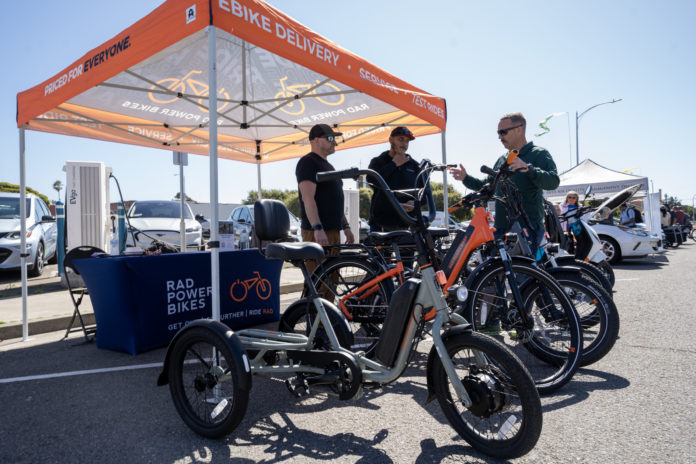Dozens of people interested in learning more about electric vehicles, ride share programs, and other ways to reduce their carbon footprints gathered at Richmond Civic Center Plaza Thursday for the ninth “Drive Electric” event.
Part of National Drive Electric Week, the event raises awareness about electric vehicles as an option. Volunteers set up booths to interact with passersby during lunch time. Some learned about electric car and bike rebate programs from the Bay Area Air Quality Management District and Metropolitan Transportation Commission. Others chatted with electric vehicle owners, who stood casually by their cars, answering questions.
Sue Saunders, a volunteer with Ride and Drive Clean and chair of the San Anselmo Climate Action Commission, hooked up her car’s charging port to a popcorn machine, astonishing many. She handed out bags of salty popcorn while explaining the electric car’s benefits.
Denée Evans, Richmond’s transportation services project manager, said the event was a way to educate the public about electric vehicles, which will become more common as California moves toward its goal of 100% zero-emissions vehicle sales by 2035.
“They know where to go now to gain more information, and that it’ll pique their interest to start looking at options to purchase vehicles,” Evans said.
According to the California Energy Commission, there were 44,133 electric vehicles on the road in Contra Costa County at the start of the year, making up 3.8% of the car population in the county. Evans thinks people are still not sold on the idea of electric vehicles, as they are considered “new technology.” However, she believes’ views will change after people interact with electric vehicle owners and learn about their benefits.
One of the cars that caught people’s eye was a 1968 Volkswagen Beetle converted to a fully electric car. Kris Whitten said it used to be a challenge to drive it across the Bay Bridge because of the strong side wind. Now, because the battery added 400 pounds to the car, he speeds across.
Saunders said she drives electric because of environmental concerns.
“I just personally would not feel good about buying a gas car, and I’ll never go back to gas,” she said.
Many attendees, much like the EV owners, wanted to switch because of high gas prices and environmental concerns. But they also expressed concerns about the lithium batteries that fuel the cars and the lack of charging stations that keep people like Whitten from using their cars for long distances.
While electric vehicles save owners money in gas, they tend to cost more than gas-powered cars and repairing them can be more expensive. The average electric vehicle in 2021 was priced about $10,000 higher than the average car, according to the Natural Resources Defense Council, which noted that EVs are becoming more affordable with each passing year.

Prior to speaking with the EV owners, Joanne Wong already had her eye on a Hyundai IONIQ 5. Wong laughed and said she wanted a bigger car so if a wildfire happens, she could carry more stuff away.
Prior to speaking with the EV owners, Joanne Wong already had her eye on a Hyundai IONIQ 5. Wong laughed and said she wanted a bigger car so if a wildfire happens, she could carry more stuff away.
Caring about reducing her carbon footprint, Wong installed solar panels at her home. Wong said she would probably make the transition to an electric vehicle after two years, as she is still waiting for more innovations in the field, such as faster charging speed and ways of powering cars without batteries.
Bay Area Air Quality Management District’s Clean Cars for All Program offers grants on an income-qualified basis for electric vehicle purchases. It also offers to buy old, used cars for up to $9,500.
Apolonio Valdovinos hopes the switch would save money and be good for the environment. However, he is also concerned about the rare earth material in electric car batteries, adding that mining also may be harmful.
Saunders believes driving an EV is still a better option.
“Yes, EV mining, it’s not perfect. There is no perfect solution to climate change,” she said. “But a gas car’s cleanest day is when it leaves the lot, and an electric car’s dirtiest day is when it leaves the lot. So within 5,000 miles, you have made up for the minerals that you use. After that, you are zero emissions when you’re charging clean energy.
Evans said that in the past few years, it has become easier to drive an EV, as more charging stations have been installed. In Richmond, there were three chargers in 2016 and today, she said, there are 36, including two Tesla hubs and one Electrify America hub.
For people who want to reduce their carbon footprint but aren’t looking at purchasing electric vehicles, Evans recommends two programs in Richmond: Miocar, an electric car share, and Richmond Moves, an on-demand ride share for trips within the city.
“I just hope that people are open to at least learning more about electric vehicles and considering it as an alternative means of transportation,” Evans said.

